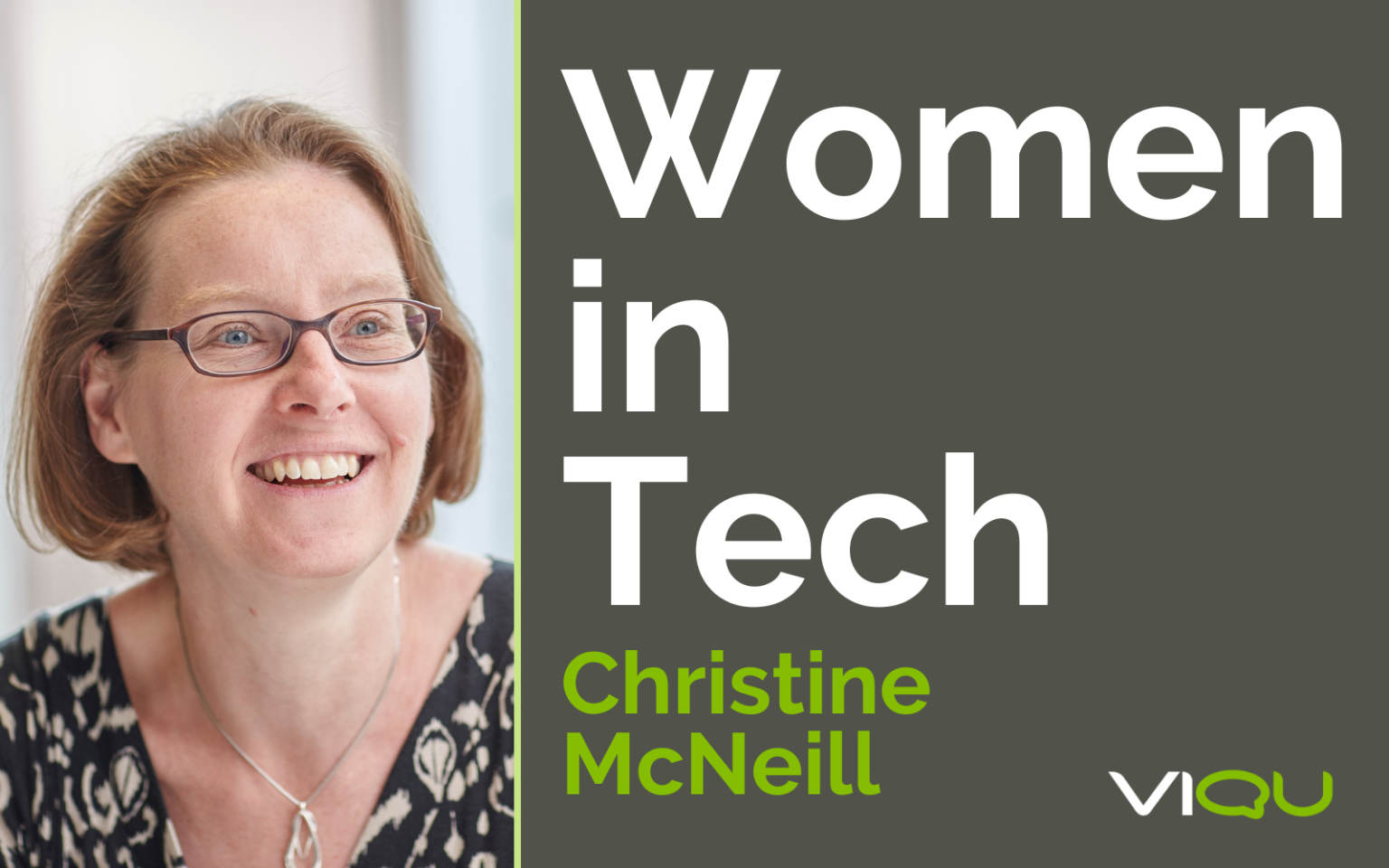Women In Tech: Q&A With Supply Chain Specialist, Christine McNeill

With Gartner’s latest ‘Women in Supply Chain’ survey highlighting how 26% of C-suite and exec roles in supply chain are now filled by women, I was pleased to sit down with supply chain specialist, Christine McNeill, who heads up client engagement at SupplyVue.
In this Q&A, we discuss Christine’s experiences as a young woman studying Physics at the University of Oxford in the 80s, how Christine began her journey to become a supply chain practitioner, and why she believes employers have a huge responsibility to increase the representation of women in the supply chain industry and beyond.
Could you tell us about your role and core responsibilities?
I’m Head of Client Engagement at SupplyVue. Broadly speaking, I have two main areas of responsibility.
1) Working with our clients – hence my job title! I ensure they are getting the best out of the SupplyVue product.
2) Working with our development team to ensure SupplyVue is the best possible product it can be. I do this primarily through feedback from our clients.
Industry best practice also impacts my work. I’ve been a supply chain practitioner for over 25 years. I go to conferences and networking events, and I lean on my contacts in the industry. My aim is to make sure our product has the best supply chain features, so that our clients can achieve improvements in their supply chains.
What is a typical day like for you?
I start the day with a coffee and a crossword puzzle. Then, I like to keep my morning ringfenced for working on thorny problems. I try to make them as free from meetings and calls as possible.
We offer services work with the SupplyVue product, and I’m involved in delivering that offering. My morning can include anything from working on client data, to modelling optimal supply chain solutions for our clients, to working on the specifications of new features that I can take to our developers to build.
My afternoons are dominated by meetings and calls. Internal meetings can cover anything from product development and issue triage, to project management. External meetings can include supporting clients with using the product and helping them to model and plan their supply chains.
Sometimes this includes ‘what if’ scenario modelling, such as “What if we decide to double our demand in this market? What are the implications and how would we need to adapt our supply chain?”
Or sometimes it’s a more general assessment to ensure the policies and parameters that the client is using to run their supply chains are up to date and reflect the ever-changing marketplace.
You have a degree in Physics from the University of Oxford. How did that lead you to what you do today?
I still like to think of myself as a scientist. There is a lot of mathematics and critical thinking in what I do, and my scientific background enables me to break down problems into their constituent parts and then develop a plan to resolve them systematically. This is essential both when I’m working with clients and when I’m collaborating internally with our development team.
Was your first role out of university a thought-out step?
I wasn’t sure what I wanted to do after university. I just felt that joining one of the large graduate trainee schemes would offer me the opportunity to work in lots of different areas, so that’s what I did. After spending some time in marketing, and then in sales, where I was selling industrial gases in the northeast of England (I’m actually a qualified welder as a result of that!), I then moved into the supply chain team, which ignited my interest in the area. I’ve been in supply chain-based roles ever since.
You’ve worked across a number of industries; some are seen as male-dominated. Have you noticed a lack of women in the workplace throughout your career?
Honestly, yes. Ever since I started studying STEM A Levels back in the 80s, I’ve been in a male-dominated world, and that didn’t change when I started out in supply chain roles.
However, I’d say I’ve noticed small changes in male-to-female ratios as I’ve progressed. At my previous company, they made a concerted effort to ensure their graduate intake represented the ratio of men to women in the STEM graduate pool. But obviously, that’s still mirroring a smaller percentage of women studying the subject. So clearly, we need to get more girls studying STEM subjects in school and then university in the first instance.
Was your degree very male-dominated?
In my college, there were 10 physicists. Originally, there was me and 2 other girls. However, by the end of first year, one had changed to Geography, and the other was studying PPE. So I was the last woman standing!
What do you think schools and colleges could do to encourage more girls to study STEM subjects?
As a teenager, I attended a couple of ‘Women in STEM’ taster courses. I remember doing ‘Women in Physics’ at Manchester University, and ‘Women in Material Science’ at Imperial. Facilitating all-female environments where girls are given the opportunity to explore these subjects in comfortable surroundings can be really eye-opening and engaging.
I think female and male teachers actively encouraging any interest (no matter how small!) is important. But I think as employers and industry leaders, we need to stop relying on education alone to harbour this interest.
We need to look at a more diverse pool. If we narrow ourselves to only women who have studied STEM subjects at university, we might be missing out on some great talent. For example, I know a very good developer who studied Ancient Greek at university!
It might be more efficient to recruit from STEM subjects into technical roles, but it’s not necessarily giving employers the best talent or helping issues around the lack of women.
So if you only fish in the same pond, you will get the same results?
Exactly. It’s not just looking at different university subjects, we need a wider approach. Employers need to consider whether there are roles where applicants could come from an apprenticeship background, instead of through university. I think this would definitely help matters because otherwise, you’re restricted to a small pool of women who chose to do STEM A Levels and then a science, mathematics, or technology-based degree at university.
The larger the variety of voices we can bring into the workplace, the more our products and services will benefit from their diverse experiences and backgrounds.
Do you think there is anything else businesses should be actively doing?
Be open-minded during the recruitment process, and then ensure employees have a safe environment to operate in. There shouldn’t be a lad culture, or decisions being made in the pub during footie on a Saturday.
I have been very lucky to work for some great companies that care about diversity. At SupplyVue, we are a very small team, and I’m the only woman. Yet, I think they do a great job at making me feel included, especially at social events and team celebrations. They always ask me to take the reins for those kinds of things, so that I feel comfortable, and everyone can get involved.
Do you think your gender has impacted the way you have been perceived / treated at any point in your career?
To be honest, I’ve been lucky to be judged on my performance rather than my gender for the majority of my career. But there have been a few testing moments.
A low point for me was being muted whilst on a Teams call with a group of male colleagues. That was quite shocking. And I think it made the vast majority of people on the call quite uncomfortable too.
When I was selling industrial gases, you can probably imagine some of the workshops I visited were quite oily and greasy, and they didn’t necessarily have the nicest, most welcoming pictures on the walls…
What moments in your career are you particularly proud of?
I’ve worked on all sorts of projects and done some really great things with some brilliant teams. But some standouts would be working on one of the early .com startups when I was with Accenture, setting up a European operations centre in the Netherlands while at BAT, and then of course, my journey with SupplyVue.
Previously, SupplyVue was a standalone on-premise tool for one company, and now it’s a cloud-based product used across a variety of industries and we are adapting it to give companies better visibility and modelling of the carbon impact of their supply chains.
Do you have any role models?
I know it sounds corny, but I have to say my mum. She was incredibly bright, but really understood the value of hard work. Most importantly, she was a very kind person.
What advice would you give to women looking to explore technical careers?
Be loyal to the team you’re with, but don’t let that stop you being open to new opportunities in different companies, disciplines, industries, countries… Men are often better than women at balancing loyalty to their employer with loyalty to themselves and grasping the great opportunities that could be out there. As women we need to do more of that!
Thank you for reading our latest interview in our Women in Tech series with supply chain specialist, Christine McNeill. You can access more interviews from the series here.
Please click here to get in touch if you are looking for talented individuals to join your tech team!
Similar articles you might like...

In The Age Of Artificial Intelligence, Why Are Businesses Prioritising Female Decision-Makers?
It has been found that employing women in AI teams and leadership positions is strategically important for tech businesses as AI grows in popularity.

Q&A With Currys’ Women In Tech: Part 2
In the final half of this Q&A with Philippa, Nia and Diane from Currys, they discuss what businesses should be doing to attract more women into tech, and the advice they'd give to individuals looking to explore careers in technology.
Latest jobs
IT Risk & Controls Lead
 London, United Kingdom
London, United Kingdom
 £55k - 63k per year
£55k - 63k per year
IT Risk & Controls LeadLondon – Hybrid (2 DPM in office)Up to £63,000VIQU have partnered with a leading organisation who are seeking an IT Risk & Controls Lead to join their IT risk management team.The...
Site Supervisor
 Stone, United Kingdom
Stone, United Kingdom
 Market Related
Market Related
Job Title: Site Supervisor Location: Stone (on-site)- must have full UK Driving License. Salary: market- relatedVIQU has partnered with a top engineering company seeking a Site Supervisor to create and manage project plans. The...
Installation Co-Ordinator
 Winchester, United Kingdom
Winchester, United Kingdom
 £250 - 350 per day
£250 - 350 per day
Installation Co-Ordinator – 3-month contract – Hampshire My customer is looking for a proactive and organised Installations Co-Ordinator to manage and support the installation of IT products and services across their trade and supply locations....
Network and Security Specialist
 London, United Kingdom
London, United Kingdom
 Market related
Market related
Network and Security SpecialistLondon – Hybrid (4 days weekly in office)Competitive Salary + Car allowanceVIQU have partnered with a prestigious Fortune 500 company that is looking to hire a Network and Security Specialist. The Network...
Financial Accountant
 Stone, United Kingdom
Stone, United Kingdom
 Market related
Market related
Financial AccountantStone - HybridCompetitive SalaryVIQU have partnered with a leading entity in operational technology and digital transformation. Operating in highly regulated and demanding industrial sectors, they have successfully executed pivotal projects across energy, nuclear, renewables,...

